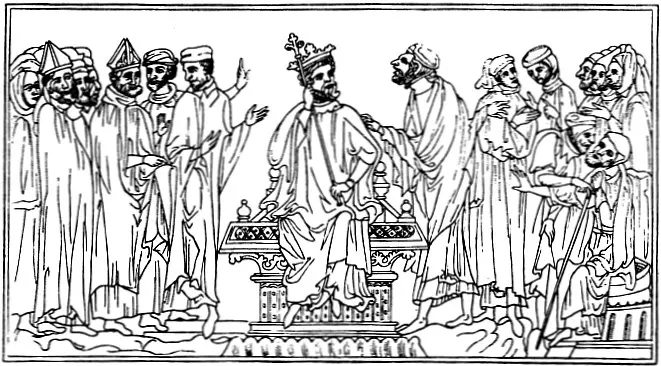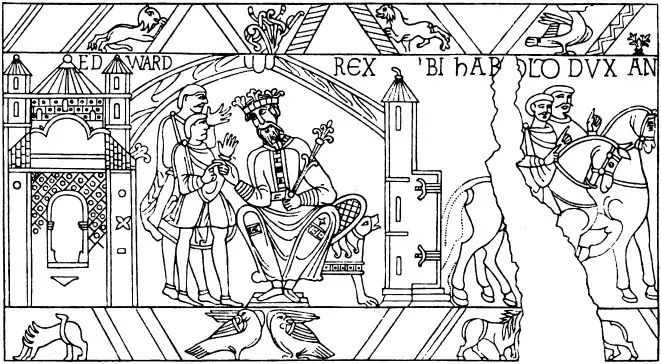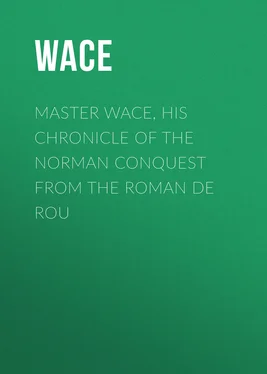Wace - Master Wace, His Chronicle of the Norman Conquest From the Roman De Rou
Здесь есть возможность читать онлайн «Wace - Master Wace, His Chronicle of the Norman Conquest From the Roman De Rou» — ознакомительный отрывок электронной книги совершенно бесплатно, а после прочтения отрывка купить полную версию. В некоторых случаях можно слушать аудио, скачать через торрент в формате fb2 и присутствует краткое содержание. Жанр: foreign_prose, История, foreign_edu, foreign_antique, на английском языке. Описание произведения, (предисловие) а так же отзывы посетителей доступны на портале библиотеки ЛибКат.
- Название:Master Wace, His Chronicle of the Norman Conquest From the Roman De Rou
- Автор:
- Жанр:
- Год:неизвестен
- ISBN:нет данных
- Рейтинг книги:4 / 5. Голосов: 1
-
Избранное:Добавить в избранное
- Отзывы:
-
Ваша оценка:
- 80
- 1
- 2
- 3
- 4
- 5
Master Wace, His Chronicle of the Norman Conquest From the Roman De Rou: краткое содержание, описание и аннотация
Предлагаем к чтению аннотацию, описание, краткое содержание или предисловие (зависит от того, что написал сам автор книги «Master Wace, His Chronicle of the Norman Conquest From the Roman De Rou»). Если вы не нашли необходимую информацию о книге — напишите в комментариях, мы постараемся отыскать её.
Master Wace, His Chronicle of the Norman Conquest From the Roman De Rou — читать онлайн ознакомительный отрывок
Ниже представлен текст книги, разбитый по страницам. Система сохранения места последней прочитанной страницы, позволяет с удобством читать онлайн бесплатно книгу «Master Wace, His Chronicle of the Norman Conquest From the Roman De Rou», без необходимости каждый раз заново искать на чём Вы остановились. Поставьте закладку, и сможете в любой момент перейти на страницу, на которой закончили чтение.
Интервал:
Закладка:
King Edward was debonaire; he neither wished nor did ill to any man; he was without pride or avarice, and desired strict justice to be done to all 109 109 Benoit de Sainte-More thus describes Edward: Ewart li juz e li verais, Qui Engleterre tint en pais, Cume hauz reis, veirs crestiens, Pleins de duçur et de toz biens.
. He endowed abbeys with fiefs, and divers goodly gifts, and Westminster in particular. Ye shall hear the reason why. On some occasion, whether of sickness or on the recovery of his kingdom, or on some escape from peril at sea, he had vowed a pilgrimage to Rome, there to say his prayers, and crave pardon for his sins; to speak with the apostle, and receive penance from him. So at the time he had appointed, he prepared for his journey; but the barons met together, and the bishops and the abbots conferred with each other, and they counselled him by no means to go. They said they feared he could not bear so great a labour; that the pilgrimage was too long, seeing his great age; that if he should go to Rome, and death or any other mischance should prevent his return, the loss of their king would be a great misfortune to them; and that they would send to the apostle 110 110 The pope.
, and get him to grant absolution from the vow, so that he might be quit of it, even if some other penance should be imposed instead. Accordingly they sent to the apostle, and he absolved the king of his vow, but enjoined him by way of acquittance of it, to select some poor abbey dedicated to St. Peter, honoring and endowing it with so many goods and rents, that it might for all time to come be resorted to, and the name of St. Peter thereby exalted.

Edward received the injunction of the apostle in good part. On the western side of London, as still may be seen, there was an abbey of St. Peter, which had for a long time been greatly impoverished; it is situate on an island of the Thames called Zonee (Thorn-ee) 111 111 Wace's Saxon, where it occurs, is very imperfect, and probably his French transcribers (we having no original MSS.) have made it worse than it was. Zonee or Zon-ey is of course Thorn-ey; the Saxon 'th' being turned into 'z.' An old Latin chronicle, quoted by M. Pluquet, has, 'in loco qui Thornie tune dicebatur, et sonat quasi—spinarum insula,' One of William's first religious donations was to this his predecessor's favourite establishment; and he records in the charter his title to the kingdom of England, and the mode he adopted for vindicating it. 'In nomine sanctæ et individuæ Trinitatis, anno Dom. incarn. mixº vijº. Ego Willelmus Dei gratiâ dux Normannorum, per misericordiam divinam, et auxilium beatissimi apostoli Petri pii fauctoris nostri, favente justo Dei judicio, Angliam veniens, in ore gladii regnum adeptus sum, anglorum devicto Haroldo rege, cum suis complicibus; qui michi regnum, providentiâ Dei destinatum, et beneficio concessionis domini et cognati mei gloriosi regis Edwardi concessum, conati sunt auferre,' See MSS. Cott. Faust. A. III. fol. 37, quoted in Ellis, Domesday , i. 312.
, so named because there were plenty of thorns upon it, and water around it; for the English call an island 'ee,' and what the French call 'espine' they call 'zon' (thorn); so that 'Zon-ee' (Thorn-ee) in English means 'isle d'espine' in French. The name of Westminster was given to it afterwards, when the minster was built King Edward perceived that there was much to improve at Westminster; he saw that the brotherhood were poor, and the minster decayed; and by counsel of clerks and laymen, while the country was in prosperity, he with great labour and attention, restored and amply endowed it with lands and other wealth. He gave indeed so much of his own, of fair villages, rich manors and lands, crosses and other goodly gifts, that the place will never know want, if things are managed honestly. But when each monk wants much service, is greedy of money, and makes a purse; the common stock soon wastes accordingly. Thus, however, the king restored Westminster, and held the spot dear, and loved it well. He also afterwards gave so much to St. Edmund (Bury), that the monks who dwell there are very rich.
King Edward was now of a good age; his reign had been long, and to his sorrow he had no child, and no near relation to take his kingdom after him, and maintain it. He considered with himself who should inherit it when he died; and often bethought him, and said he would give his inheritance to duke William his relation, as the best of his lineage. Robert his father had brought him up, and William himself had been of much service to him; and, in fact, all the good he had received had come from that line, and he had loved none so well, however kindly he might behave to any one else. For the honor thereof of his good kinsman, with whom he had been brought up, and on account of the great worth of William himself, he determined to make him heir to the realm.

CHAPTER VIII.
OF HAROLD'S JOURNEY TO NORMANDY, AND WHAT HE DID THERE
Now in that country of England there was a seneschal 112 112 Seneschal, 'lieutenant du duc pour l'administration civile;' 'ce mot, dérivé de la langue Franke, signifie proprement serviteur gardien des troupeaux ou gardien de la famille, senes-skalch. C'était un office de la maison des rois franks, et, par suite de la conquête, une dignité politique de la Gaule.' Thierry , i. 270.
, Heraut 113 113 Wace generally writes Harold's name thus; we shall, however, henceforth use the usual historical spelling: as also in the case of Godwin, whom Wace calls Gwigne, and some of the Norman chronicles Gaudvin.
by name, a noble vassal, who on account of his worth and merits, had great influence, and was in truth the most powerful man in all the land. He was strong in his own men, and strong in his friends, and managed all England as a man does land of which he has the seneschalsy. On his father's side he was English, and on his mother's Danish; Gite 114 114 Alias Githe or Githa.
his mother being a Danish woman, born and brought up in great wealth, a very gentle lady, the sister of King Kenut. She was wife to Godwin, mother to Harold, and her daughter Edif 115 115 Ead-githa of the Saxon chronicle, who married in 1043, and died in 1075.
was queen. Harold himself was the favourite of his lord, who had his sister to wife. When his father had died (being choked at the feast), Harold, pitying the hostages, was desirous to cross over into Normandy, to bring them home. So he went to take leave 116 116 The scene of the Bayeux tapestry opens here.
of the king. But Edward strictly forbade him, and charged and conjured him not to go to Normandy, nor to speak with duke William; for he might soon be drawn into some snare, as the duke was very shrewd; and he told him, that if he wished to have the hostages home, he would choose some messenger for the purpose. So at least I have found the story written 117 117 'I cannot say how the truth may be, I but tell the tale as 'twas told to me.' Benoit de Sainte-More sends the archbishop of Canterbury to William, at Edward's desire, to convey his intention of leaving to the duke the inheritance of the English crown. L'arcevesque de Cantorbire, Li plus hauz hom de son empire, Out en Normendie tramis, Les anz avant, si cum je vos dis, Por afermer ce qu'il li done, Tot le reaume e la corone. And Harold's mission is described as being expressly intended, in the following year, to confirm the same bequest: Por estre plus certains e meres, E qu'il n'i sorsist encombrier, Resout l'ovre plus esforcier. Heraut, qui quens ert del pais, Trestot li plus poestéis Que nul des autres del reiaume, Ce lui tramist al duc Guillaume, Que del regne enterinement Tot qui a la corone apent Li feist feuté jurée, Eissi cum ele ert devisée: Veut qu'il l'en face serrement Et qu'il l'en donge tenement....
. But another book tells me that the king ordered him to go, for the purpose of assuring duke William, his cousin, that he should have the realm after his death. How the matter really was I never knew, and I find it written both the one way and the other.
Интервал:
Закладка:
Похожие книги на «Master Wace, His Chronicle of the Norman Conquest From the Roman De Rou»
Представляем Вашему вниманию похожие книги на «Master Wace, His Chronicle of the Norman Conquest From the Roman De Rou» списком для выбора. Мы отобрали схожую по названию и смыслу литературу в надежде предоставить читателям больше вариантов отыскать новые, интересные, ещё непрочитанные произведения.
Обсуждение, отзывы о книге «Master Wace, His Chronicle of the Norman Conquest From the Roman De Rou» и просто собственные мнения читателей. Оставьте ваши комментарии, напишите, что Вы думаете о произведении, его смысле или главных героях. Укажите что конкретно понравилось, а что нет, и почему Вы так считаете.












